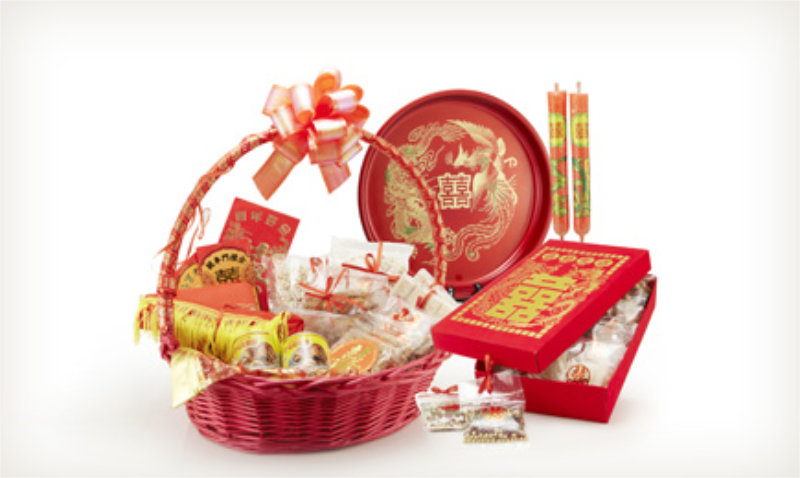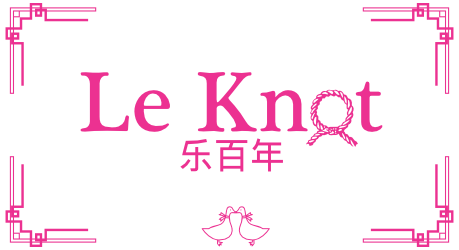In our modern context, this laborious process of unification between two families has been simplified into these important steps:

Betrothal Gifts (娉礼/过大礼)
The betrothal gifts are prepared based on the bride and groom’s dialect groups and is sent to the bride’s family to confirm the marriage agreement between the two families. Le Knot a Chinese Wedding Shop in Singapore can help you with this.
In the olden days, the value of the betrothal gifts determines the financial stability of the groom.
It is a traditional way of thanking and showing respect to the bride’s parents for raising the bride, and a desire to forge good relations with the future parent-in-laws. In accepting the gifts, the bride’s parents formally pledge her to the groom.

Return Gifts(回礼)
Upon receipt of the betrothal gifts from the groom, the bride’s family reciprocates the generous gesture by returning a portion of the gifts. This plays a significant role in suggesting that the groom’s family is overly generous, that the bride’s family is not greedy, and most importantly, that the two families will share their good fortune.
Bridal cakes received from the groom’s family is usually distributed to friends and relatives as a form of announcement and invitation to the upcoming wedding banquet.

Bride’s Dowry(嫁妆)
The dowry represents the wealth and prosperity of the bride’s family and is also a firm display of the bride’s family’s love for their daughter; it encases within the blessings for their daughter and future son-in-law.

Bed Setting(安床)
This essential practice is done to bless the bride and groom with good health, and an abundance of fortune and offspring.

Hair Combing(上头)
The traditional hair combing ritual is a practice where the parents will comb their children’s hair as a symbolic way for them to move on to the next stage of life in adulthood.
Auspicious blessings are uttered with each stroke so as to bless the marriage and their children’s future.

Done on the Wedding day:
Fetching the Bride (接新娘)
This essential practice is done to bless the bride and groom with good health, and an abundance of fortune and offspring.

Arriving at Groom‘s place and Tea ceremony (过门, 敬茶)
The traditional hair combing ritual is a practice where the parents will comb their children’s hair as a symbolic way for them to move on to the next stage of life in adulthood.
Auspicious blessings are uttered with each stroke so as to bless the marriage and their children’s future.

Bride‘s Home visit (三朝回门)
Three days after the wedding ceremony, the newly wedded couple should return to the bride’s home with a whole roasted pig that signifies the bride’s chastity, together with wine, chicken, cakes, fruits, egg E-fu noodles, pork tripe and pork etc… The bride’s family will reward the groom with gifts that is worth half of what he bought. However, many people choose to simplify this procedure nowadays and have the bride return home on the wedding day in the afternoon before the banquet begins in the evening.
The groom is introduced to the bride’s family at the tea ceremony during the bride’s home visit. The bride’s mother’s wedding tea set, if available, is used for this ceremony. Otherwise, any nice tea set can be used.

Wedding Banquet (宴席)
A wedding banquet is a lunch or dinner held after the completion of a marriage ceremony.
While the wedding itself is often based on the couple’s choices, the wedding banquets are a gesture of “thanks” and appreciation, to those that have raised the bride and groom (such as grandparents and uncles). It is also to ensure the relatives on each side meet the relatives on the other side. Thus out of respect for the elders, wedding banquets are usually done formally and traditionally, which the older generation is thought to be more comfortable with.
Chinese wedding banquets are traditionally paid for by the groom’s parents. The bride’s parents and relatives are invited guests.
It is traditional for the bride’s parents to ask for a few tables at the wedding banquet during the wedding negotiations. It is considered as part of the bride’s price.
Modern day financially independent bride and groom will also pay for their own tables for inviting their friends and colleagues.

